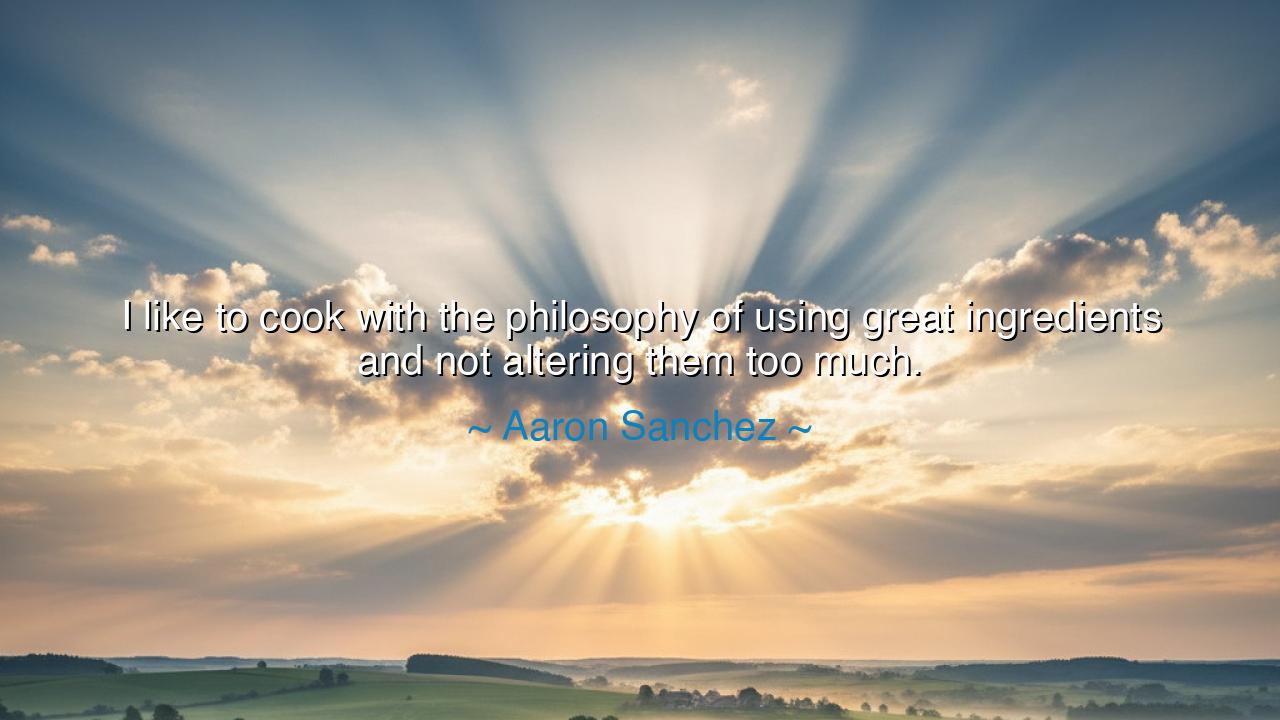
I like to cook with the philosophy of using great ingredients and
I like to cook with the philosophy of using great ingredients and not altering them too much.






"I like to cook with the philosophy of using great ingredients and not altering them too much." – Aarón Sánchez
So spoke Aarón Sánchez, a chef whose art rises not from excess but from respect — respect for the earth, for the ingredient, and for the sacred simplicity of taste. When he said, “I like to cook with the philosophy of using great ingredients and not altering them too much,” he revealed a wisdom that transcends the kitchen and touches the very essence of life itself. For in his words lives an ancient truth: that greatness does not require adornment, and that the highest form of creation is often not to add, but to reveal.
This philosophy has its roots in the culinary traditions of the old world — in the rustic villages of Spain, in the markets of Mexico, in the gardens of the Mediterranean — where food was not a product of luxury, but of reverence. The cook was not a magician turning the ordinary into gold; he was a guardian, honoring the natural spirit of the harvest. Sánchez, trained in the rich and soulful flavors of Latin America, inherited this ancient belief. He understood that the tomato, the chili, the corn, the herb — each carries within it a story written by the sun, the soil, and the seasons. To smother these gifts in excess is to silence their voice. His philosophy, then, is one of humility before nature, of letting things speak in their purest form.
Consider the farmers and artisans who nurture these ingredients. The fisherman who rises before dawn, the baker who kneads the dough at first light, the grower who tends to his field with care — each one shapes the ingredient’s journey before it ever reaches the chef’s hands. When Sánchez speaks of “not altering them too much,” he honors their labor, their patience, their craft. To cook simply is not to cook carelessly; it is to recognize that the beauty of the world is already present, waiting to be unveiled. The art is not in transformation, but in revelation.
The ancients understood this principle long before the word “chef” was born. The philosophers of Greece spoke of arete — excellence achieved through harmony with nature, not dominance over it. The Japanese spoke of wabi-sabi — the beauty of imperfection and simplicity. And in the temples of early Rome, cooks offered plain bread, wine, and olive oil to the gods — not elaborate feasts, but pure symbols of gratitude. So too does Sánchez stand in this lineage, teaching that true mastery lies in restraint. To overwhelm the natural with invention is to forget that the world itself is already divine.
And this wisdom reaches beyond the kitchen. It teaches us how to live. In our age of noise and excess, we are tempted to alter ourselves endlessly — to decorate, to disguise, to chase the illusion of improvement. But Sánchez’s words remind us that the finest life, like the finest meal, is one that honors its essence. The ingredients of our character — kindness, courage, honesty — need not be smothered by pretense. When we refine without distortion, when we live simply yet truly, we too become nourishment for the world.
There is a story told of an old Italian chef who, when asked for the secret to his famous soup, replied, “I do not cook it; I listen to it.” Such is the heart of Sánchez’s philosophy. Cooking — like living — is a conversation, not a conquest. The great ingredient, like the human soul, does not demand reinvention; it asks only to be understood. The chef who listens finds balance, just as the wise person who listens finds peace.
So, my child of creation, take this lesson to heart: seek purity, not complication. In your art, your work, and your life, trust the strength of what is already good. Cultivate your ingredients — your talents, your relationships, your values — and treat them with care. Do not drown them in ambition or vanity, but allow them to breathe, to shine, to feed others with authenticity. For just as a ripe tomato needs no disguise, so too a true soul needs no mask. Remember always: the best flavor comes from truth, and the greatest beauty is born of simplicity honored, not altered.






AAdministratorAdministrator
Welcome, honored guests. Please leave a comment, we will respond soon